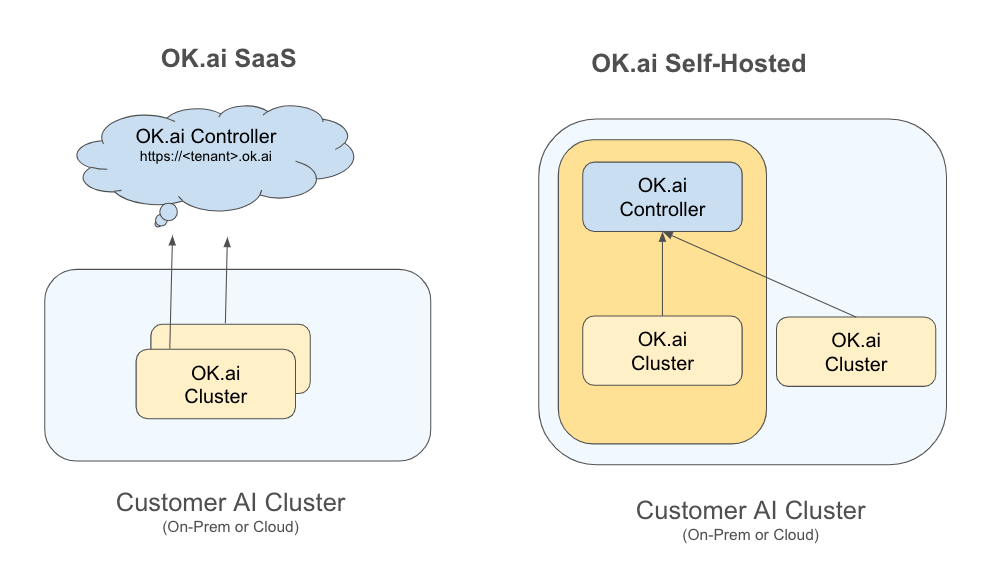OpenKubes Kubernetes Service Platform

About OpenKubes
In today’s fast-paced digital world, agility, scalability, and innovation are key drivers of business success. With OpenKubes we deliver an enterprise-grade Kubernetes solution designed to meet the complex demands of modern organizations. Our platform is built on a robust infrastructure that consists of at least three specialized Kubernetes clusters, ensuring unmatched efficiency, reliability, and performance for managing and operating modern IT environments.
Our Mission
At Kubernauts GmbH, we understand the challenges organizations face when managing their IT infrastructure in a digital-first world. Our mission is to empower businesses by providing a powerful Kubernetes platform that simplifies container management, accelerates digital transformation, and drives innovation. OpenKubes offers a flexible, scalable solution that helps organizations make the most of their IT resources and quickly adapt to changing market conditions.
What Makes OpenKubes Unique?
1. Robust Cluster Architecture:
The OpenKubes platform is built on a structured cluster architecture, featuring:
- Management Cluster: The core control system for orchestrating and managing Kubernetes components.
- Monitoring Cluster: A dedicated monitoring cluster providing real-time insights into performance and security.
- Worker Cluster: The powerhouse for executing applications, optimized for maximum performance, security, and scalability.
2. Advanced Automation and Infrastructure Management:
OpenKubes integrates leading-edge tools like Terraform, Ansible, and Pulumi, offering seamless automation and orchestration for infrastructure management, enabling rapid deployment, version control, and collaboration.
3. Monitoring and Anomaly Detection:
With powerful monitoring tools such as Prometheus and OpenSearch, along with AI-driven anomaly detection via Opni, OpenKubes ensures early detection of issues to minimize downtime and keep your operations running smoothly.
4. Enterprise-Level Security:
Security is built into the foundation of OpenKubes. With features like role-based access control (RBAC), encryption at rest and in transit, and runtime security tools like Falco, your applications and data are fully protected.
5. Multi-Cloud Flexibility:
As a cloud-agnostic platform, OpenKubes supports both on-premises and hybrid cloud environments, including AWS, Azure, and Google Cloud, providing your business with the flexibility to operate across multiple platforms.
Solutions for Your Business Needs
OpenKubes is designed for organizations of all sizes across various industries looking to optimize their IT infrastructure. Here are some key use cases:
- Artificial Intelligence (AI) and Machine Learning (ML) with AI On-Prem: Provides the infrastructure required to support ML workflows with GPU and TPU support.
- Internet of Things (IoT): Manages edge devices and real-time data processing for IoT-powered applications.
- Robotics: Supports real-time infrastructures for robotics applications, ensuring low-latency operations.
Industries We Support
1. Healthcare:
Secure and scalable telemedicine platforms, AI-driven clinical data analysis, and medical imaging solutions for diagnostics and research.
2. Manufacturing:
Leverage IoT and machine learning to enhance predictive maintenance, reduce downtime, and increase productivity.
3. Retail and E-Commerce:
OpenKubes provides scalable infrastructure to support high-traffic e-commerce platforms, along with solutions for personalized customer engagement.
Our Vision
At Kubernauts GmbH, we’re not just a service provider – we’re your partner in digital transformation. With OpenKubes, we provide more than just a technical solution; we offer a strategic partnership that empowers innovation and drives growth within your organization. Our platform is designed to meet the challenges of modern IT by offering flexibility, automation, and security at an enterprise level.
Our Commitment to Your Success
- Expert Consultation: Our team of seasoned professionals offers in-depth analysis and tailored recommendations to meet your unique business needs.
- Customized Solutions: OpenKubes adapts to your specific requirements and scales with your organization’s growth.
- 24/7 Support: Our dedicated support team is available around the clock to ensure the smooth operation of your infrastructure.
- Continuous Innovation: We continuously invest in the development of our platform, ensuring you always have access to the latest technology.
Shaping the Future Together
The OpenKubes Kubernetes Service Platform, a product of Kubernauts GmbH, is your key to an agile and scalable IT infrastructure. Let’s transform your IT landscape and create the foundation for future success. Contact us today to discover how we can help you elevate your IT strategy to the next level.
Some Use Cases and Success Stories Across Industries

Automotive
Use Case: Optimizing Intralogistics with a Mobile Robot Fleet
- Requirement: An automotive manufacturer needed to automate material transport in its factories, reducing manual errors and optimizing production workflows.
- Solution: OpenKubes enabled the deployment of edge computing clusters to control a fleet of mobile robots, integrating IoT devices for real-time monitoring and AI for route optimization.
- Results: Reduced intralogistics costs by 25% and increased production efficiency by 30%.
Success Story: Accelerating Software Updates for Connected Vehicles
- Challenge: A car manufacturer struggled with rolling out over-the-air (OTA) updates for its connected vehicles across multiple regions.
- Solution: OpenKubes supported a multi-cluster Kubernetes architecture to manage scalable CI/CD pipelines for software updates.
- Outcome: Software update deployment times were reduced from days to hours, improving customer satisfaction and vehicle performance.
Food Industry
Use Case: Ensuring Food Safety with IoT and Blockchain
- Requirement: A global food distributor needed to enhance food safety and traceability across its supply chain.
- Solution: OpenKubes integrated IoT sensors and blockchain technology into the supply chain, enabling real-time tracking and tamper-proof records of food storage and transport conditions.
- Results: Achieved 100% compliance with international food safety regulations and increased customer trust through transparent product tracking.
Success Story: Optimizing Production with Smart Manufacturing
- Challenge: A food manufacturer wanted to reduce waste and improve energy efficiency in its production facilities.
- Solution: OpenKubes deployed edge computing for real-time data processing and analytics to monitor production lines and optimize resource usage.
- Outcome: Reduced production waste by 20% and energy consumption by 15%.
Insurance
Use Case: Modernizing Claims Processing
- Requirement: An insurance company needed a system to process claims faster during peak periods, such as after natural disasters.
- Solution: OpenKubes implemented containerized microservices and AI-powered automation for claims processing, backed by robust disaster recovery capabilities.
- Results: Reduced claims processing times by 40% and maintained 99.9% system uptime during high-demand periods.
Success Story: Personalized Insurance Recommendations
- Challenge: An insurer sought to enhance customer engagement with personalized policy recommendations.
- Solution: OpenKubes enabled the deployment of machine learning models to analyze customer data and generate tailored insurance offerings.
- Outcome: Increased customer retention by 25% and boosted policy sales through more targeted recommendations.
Banking
Use Case: Real-Time Fraud Detection
- Requirement: A bank needed to identify and mitigate fraudulent transactions in real time without affecting customer experience.
- Solution: OpenKubes deployed AI/ML models on Kubernetes clusters, monitoring transaction patterns and flagging suspicious activity.
- Results: Prevented over $10 million in fraudulent transactions annually while maintaining a seamless customer experience.
Success Story: Scaling Online Banking Services
- Challenge: A bank experienced increased traffic to its online services during the COVID-19 pandemic.
- Solution: OpenKubes implemented autoscaling and multi-cluster management to handle traffic spikes without service interruptions.
- Outcome: Ensured 100% availability and reduced response times, enhancing customer satisfaction.
Retail
Use Case: Real-Time Inventory Management
- Requirement: A retail chain needed to improve inventory visibility across hundreds of stores.
- Solution: OpenKubes deployed IoT-enabled sensors and edge clusters to monitor inventory levels in real time, integrated with cloud-based analytics.
- Results: Reduced stockouts by 35% and optimized inventory turnover.
Success Story: Personalizing Customer Experiences
- Challenge: A retailer wanted to offer personalized promotions based on customer preferences and behavior.
- Solution: OpenKubes enabled real-time data processing with AI/ML models to analyze shopping patterns and deliver targeted promotions.
- Outcome: Increased sales by 20% and improved customer loyalty through better engagement.
Try OpenKubes
Unlock the full potential of your business with the OpenKubes Kubernetes Service Platform. Embrace a future where technology is not just a tool but a catalyst for innovation and growth.
Get in touch with us today to explore how our platform can be the cornerstone of your digital strategy.
Frequently Asked Questions (FAQs)
Q1: What is the OpenKubes Kubernetes Service Platform?
A: OpenKubes is an enterprise-grade Kubernetes platform developed by Kubernauts GmbH, designed to provide scalable, secure, and efficient management of Kubernetes clusters. It helps organizations deploy and manage containerized applications in both cloud and on-premise environments.
Q2: How does OpenKubes ensure the security of my applications and data?
A: OpenKubes uses a multi-layered security approach, including encryption at rest and in transit, role-based access control (RBAC), and runtime security tools like Falco. We also offer audit logging and compliance enforcement via Open Policy Agent (OPA) to ensure security and regulatory compliance.
Q3: What industries can benefit from using OpenKubes?
A: OpenKubes is versatile and can support a wide range of industries, including healthcare, manufacturing, retail, e-commerce, and logistics. It’s particularly useful for organizations that require scalable infrastructure for applications like AI, IoT, robotics, and high-traffic online services.
Q4: Is training provided for using the OpenKubes platform?
A: Yes, we offer comprehensive training and onboarding for your teams to ensure they can fully utilize the capabilities of OpenKubes. We also provide ongoing support to help you continue to optimize your Kubernetes environment.
Q5: How can I get started with OpenKubes?
A: You can contact us through our website to schedule a consultation. Our experts will work with you to assess your needs and develop a customized solution to help you leverage OpenKubes for your IT infrastructure.
Kubernauts Worldwide Meetup
Join our online sessions at Kubernauts Worldwide Meetup and enjoy free trainings and great presentations from the kommunity!
